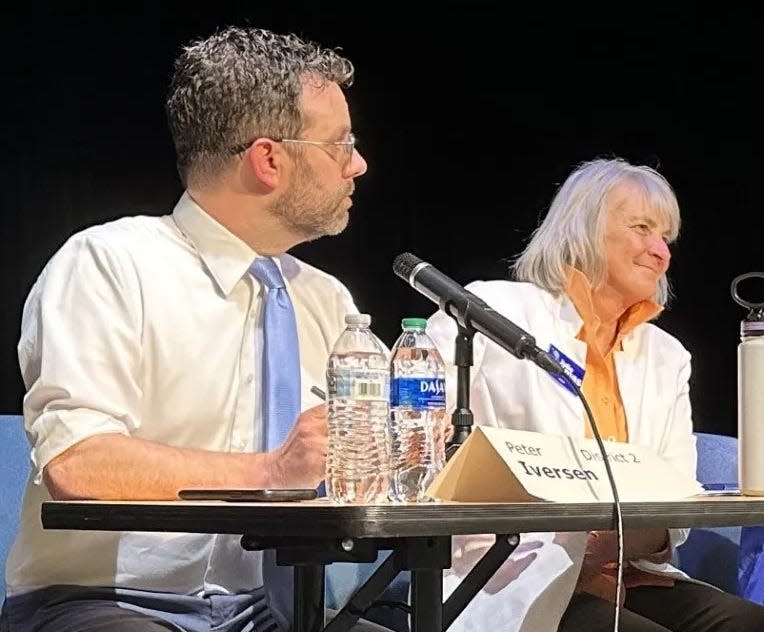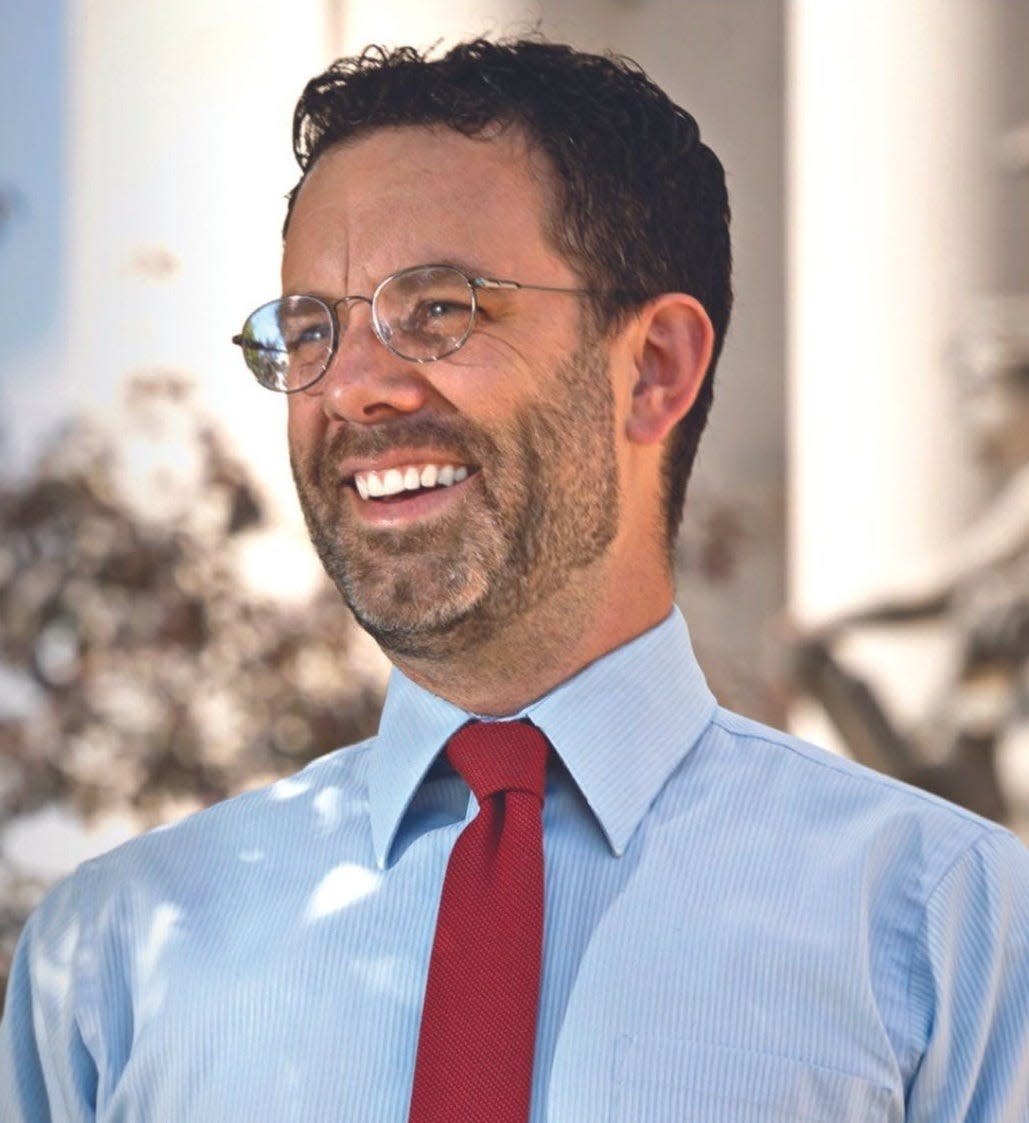Housing density, annexation: District 2 commissioner candidates answer questions

Editor's note: This is part of a series of articles about the primary election in Monroe County.
Monroe County Commissioner Julie Thomas is facing Monroe County Council member Peter Iversen in this year’s Democratic Party primary election for commissioner.
The two are vying for the Democratic Party nomination for commissioner in District 2, though all Monroe County voters — whether they live in District 2 or not — will get to weigh in if they choose the Democratic Party ballot in the primary.
No Republican candidate has filed.
Competitive: Monroe County commissioners, council members to face primary challengers
Candidates are listed in alphabetical order by last name.

Name: Peter Iversen
Date of birth: 06/02/1982
Family (marital status/children): Married with two children, both in MCCSC.
How long have you lived in Monroe County: Since 2015
Occupation: County Council member, Philanthropic Engagement Officer
Education: Bachelors: Lawrence University (International Relations & Russian Studies); Masters: O'Neill School of Public and Environmental Affairs (Public Policy)
Question 1: Why are you running for commissioner? What would you bring to the job that your opponents wouldn’t?
Iversen: I am running for County Commissioner for all of Monroe County to restore trust. So many people are fed up with the stagnation in local government. It’s evident in the delays in the convention center, the jail, housing, and more. We need a change, and I have a plan.
What I bring to the table is transparent collaboration on essential initiatives that agree with the values our community holds dear. As Commissioner, we will tackle the housing crisis, improve quality of life, increase wages, focus on equity, and address the climate crisis.
I’ve represented you on the County Council for the past five years. From this seat, I have governed in a respectful, collaborative manner. Whether it was the Justice Fiscal Advisory Council, the Substance Use Disorder Advisory Commission, or the Personnel Administration Committee, my leadership prioritized the community, and I will continue to serve you in this way.
Q2: Property tax bills, home prices and rents have been rising sharply in the last few years. For what concrete policies would you advocate to address these challenges in the short term?
Iversen: Monroe County is facing a housing crisis; we do not have enough houses for the number of folks that want to live here. The existing Commissioners exacerbated this crisis by voting three times against additional housing in 2021. More recently, they continued this policy of housing stagnation by pushing a County Development Ordinance that reduces residential parcels in favor of agricultural parcels.
To fix these issues, we need leadership who understands that these issues are intersectional and we need shared forward-thinking. The key to short-term success is that elected leaders should work together rather than as siloed bureaucrats. I plan to build on my previous successes as county councilor by addressing these issues with community members and bringing together diverse stakeholders. I will also work to repair relations with local leaders and government officials to ensure we work effectively and efficiently with authorities in Bloomington, Ellettsville, and elsewhere.
Q3: If you were faced with a decision to allow home construction on the city’s fringe, how would you balance the interest of existing homeowners, developers and future residents?
Iversen: We need more housing. The Regional Opportunities Initiative announced in a recent study update that we will need 7,412 additional housing units by 2035. The current Commissioners ignored the original 2019 study, showing such little regard for the situation that they disbanded the Monroe County Affordable Housing Commission.
The time is now to bring down the cost of a home for residents. First, we need to repair relationships between the planners and developers; when there is tension between the two, the homeowner loses. Second, we need to acknowledge that the pandemic changed standards. As folks continue to work remotely, the quality of the home and the local road and street are increasingly important. We will need creative solutions to bring expanded services into the inventory of the municipal government.
Lastly, the elected official must go to the public instead of waiting for the reverse.
Q4: The community has long been discussing replacing the current jail. Do you think it should be built in the city or outside of it? Why?
Iversen: The location of a jail is a matter of concern for many stakeholders. This apprehension is why I gathered these stakeholders during the Justice Fiscal Advisory Commission, asking this question. Their response, which I agree with, is that a jail’s location should meet two criteria. A future jail should be close to public transportation, and a future jail should be close to community services.
My vision for a jail of the future is one steeped in rehabilitation. It is one where treatment is done in the community by trained community groups, not in a carceral setting. The reentry process begins before the person spends their first night in jail, reducing recidivism. It is one where data is readily available to researchers and local interest groups. It is a place where county staff and inmates alike are safe and enjoy constitutional levels of care.
Q5: An annexation-related trial is scheduled to begin at the end of April. Do you think areas 1A and 1B, on the city’s west side, should be annexed? Why or why not?
Iversen: No, I do not. The way the city annexed these areas did not take the residents’ interests or concerns into mind. This method of top-down governance runs counter to the collaborative style of governance that I practice. We know that our communities will grow. Both Ellettsville and Bloomington are poised to grow. I envision a future where the corridor between Crane Naval Base and Monroe County’s Biomedical firms and IU research will expand. These areas are why we need to rethink the County Development Ordinance and update the Comprehensive Plan. These documents need to reflect reality, not an imagined return to an agrarian past.
This evolution will necessitate increased communication between the city/town and County. It will also dictate increased communication with residents as we don’t want to repeat the mistakes of the present.

Name: Julie Thomas
Date of birth: 1964
Family (marital status/children): married
How long have you lived in Monroe County: 30 years
Occupation: County Commissioner, District 2; part-time educator
Education: BS, BA, MA, MA, Ph.D
Q1: Why are you running for commissioner? What would you bring to the job that your opponents wouldn’t?
Thomas: I am running because I care about Monroe County and her residents as much today as when first elected. I bring experience and it matters. Collaborations across government entities while understanding the complexities of how to get projects done efficiently, effectively, and with the needs of all county residents forefront in the mind, take determination and skills that I possess. Innovation, involving residents in their government, and environmental stewardship are at the core of the work I do every day for Monroe County. For example, the commissioners have been united and pivotal in the fight to preserve the water quality of Lake Monroe – our drinking water source – among many other projects about which I am proud.
I am tested, trusted, and tough. My demonstrated commitment to Monroe County residents is explained in more detail on my website. Please visit thomasformonroecounty.org. Thank you!
Q2: Property tax bills, home prices and rents have been rising sharply in the last few years. For what concrete policies would you advocate to address these challenges in the short term?
Thomas: Diverse housing stock is needed, with good quality homes from which to choose. At our meetings, developers state the likely sale price of homes, but more often than not when housing is completed, these prices are much higher than initially stated. We cannot have an “anything goes” housing policy. We are creating a housing inventory dashboard so that we can analyze what is TRULY needed. We cannot change land prices, and we cannot stop the entities who buy up houses and then charge exorbitant rents. The city will not permit the connection of county developments to their sewer system – for now, housing density is limited by state law.
We developed rural housing repair to keep people in their homes so that they can age in place (if you live outside the city, contact your township trustee).
Another solution includes the creation of a residential TIF for (federally-qualified) affordable housing.
Q3: If you were faced with a decision to allow home construction on the city’s fringe, how would you balance the interest of existing homeowners, developers and future residents?
Thomas: To make decisions on housing, we need to balance the request with the needs of existing property owners (homes and businesses), the existing built infrastructure (roadways, stormwater), and the natural environment (drainage, soil quality and slope, karst features). With climate change, floodways are increasing. We listen to neighbors and will alter development plans to ensure that they maintain their investment and quality of life.
The city won’t connect any property in the county to their sewer system until they resolve their state lawsuit regarding legislation placing an expiration date on annexation waivers. Only with a package plan can we consider denser housing outside the city. Otherwise, state regulations require one acre of land to accommodate a septic system.
I have not accepted and will never accept campaign support from developers and builders – it is important to protect county residents and our environment.
Q4: The community has long been discussing replacing the current jail. Do you think it should be built in the city or outside of it? Why?
Thomas: We (informally and formally) considered four different city locations. There isn’t space for a one-story jail (Sheriff’s request) on downtown property owned by the county. The city denied our petition for a Fullerton Pike site. We investigated the Thomson property. After hearing from area residents and conducting extensive research, we found it would take more than two years to remove high-tension power lines and move tons of soil before we can begin to build. Waiting has a human cost we cannot afford.
We are conducting a geo-technical survey of property in North Park. The location has package sewer service, is not surrounded by dense housing, and is near the highway and hospital. Wherever we build a jail, we will ensure transportation is provided (including evenings and Sundays), free parking, and space for programming to reduce recidivism. In addition, court and justice services must be co-located with the jail.
Q5: An annexation-related trial is scheduled to begin at the end of April. Do you think areas 1A and 1B, on the city’s west side, should be annexed? Why or why not?
Thomas: A majority of residents have remonstrated (petitioned) against annexation in these areas. Their wishes should be honored. The economic impact of annexation is far too great for these residents to bear. Those who signed a remonstrance against annexation don’t believe that they will receive benefits commensurate with the estimated 50% increase in property taxes that they will be required to pay. Many residents would lose their homes, and that is unacceptable.
The state utilizes a system that is acrimonious at its core – involuntary annexation. Voluntary annexation is the law in the vast majority of states because it requires a city to demonstrate a clear benefit to property owners. I have spoken with many city residents as well who do not have sidewalks and other amenities promised in previous annexation efforts. This entire process needs to be redone and Monroe County must lead the way.
Boris Ladwig can be reached at bladwig@heraldt.com.
This article originally appeared on The Herald-Times: Democrats running for District 2 county commissioner answer questions
